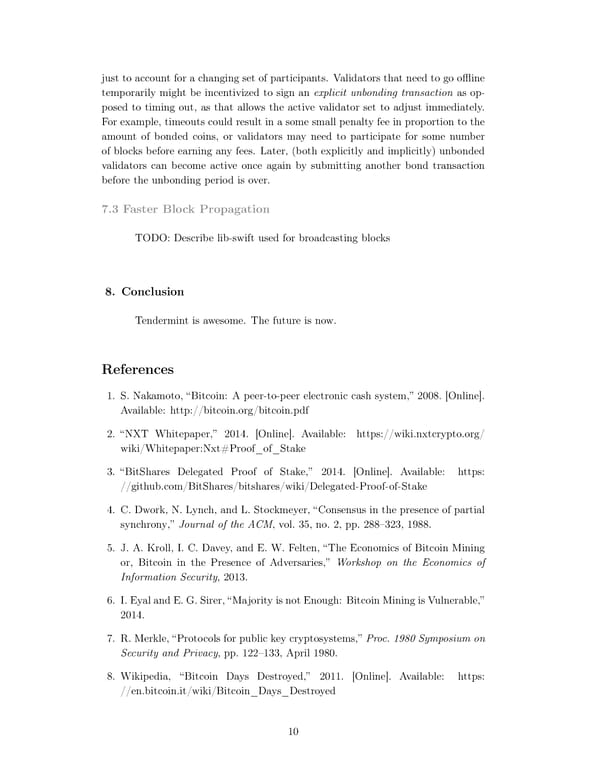just to account for a changing set of participants. Validators that need to go offline temporarily might be incentivized to sign an explicit unbonding transaction as op- posed to timing out, as that allows the active validator set to adjust immediately. For example, timeouts could result in a some small penalty fee in proportion to the amount of bonded coins, or validators may need to participate for some number of blocks before earning any fees. Later, (both explicitly and implicitly) unbonded validators can become active once again by submitting another bond transaction before the unbonding period is over. 7.3 Faster Block Propagation TODO: Describe lib-swift used for broadcasting blocks 8. Conclusion Tendermint is awesome. The future is now. References 1. S. Nakamoto, “Bitcoin: A peer-to-peer electronic cash system,” 2008. [Online]. Available: http://bitcoin.org/bitcoin.pdf 2. “NXT Whitepaper,” 2014. [Online]. Available: https://wiki.nxtcrypto.org/ wiki/Whitepaper:Nxt#Proof_of_Stake 3. “BitShares Delegated Proof of Stake,” 2014. [Online]. Available: https: //github.com/BitShares/bitshares/wiki/Delegated-Proof-of-Stake 4. C. Dwork, N. Lynch, and L. Stockmeyer, “Consensus in the presence of partial synchrony,” Journal of the ACM, vol. 35, no. 2, pp. 288–323, 1988. 5. J. A. Kroll, I. C. Davey, and E. W. Felten, “The Economics of Bitcoin Mining or, Bitcoin in the Presence of Adversaries,” Workshop on the Economics of Information Security, 2013. 6. I. Eyal and E. G. Sirer, “Majority is not Enough: Bitcoin Mining is Vulnerable,” 2014. 7. R. Merkle, “Protocols for public key cryptosystems,” Proc. 1980 Symposium on Security and Privacy, pp. 122–133, April 1980. 8. Wikipedia, “Bitcoin Days Destroyed,” 2011. [Online]. Available: https: //en.bitcoin.it/wiki/Bitcoin_Days_Destroyed 10
 Tendermint: Consensus without Mining Page 9 Page 11
Tendermint: Consensus without Mining Page 9 Page 11